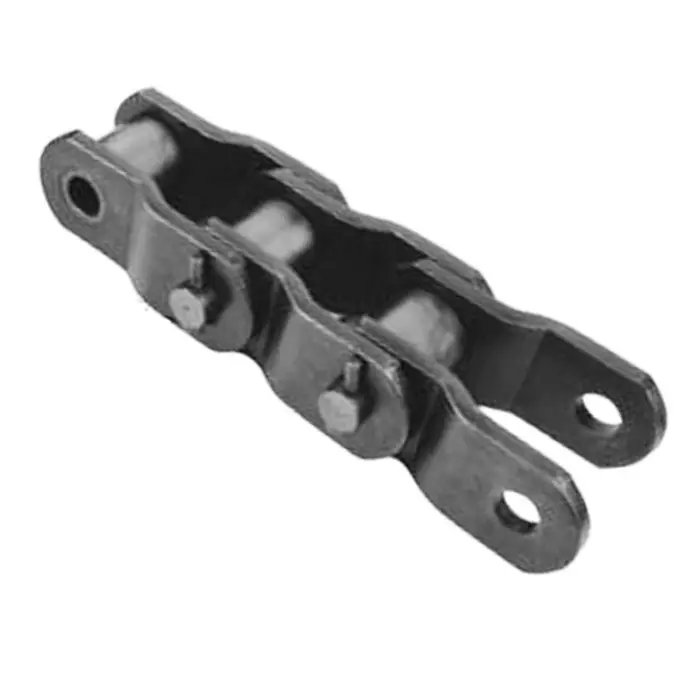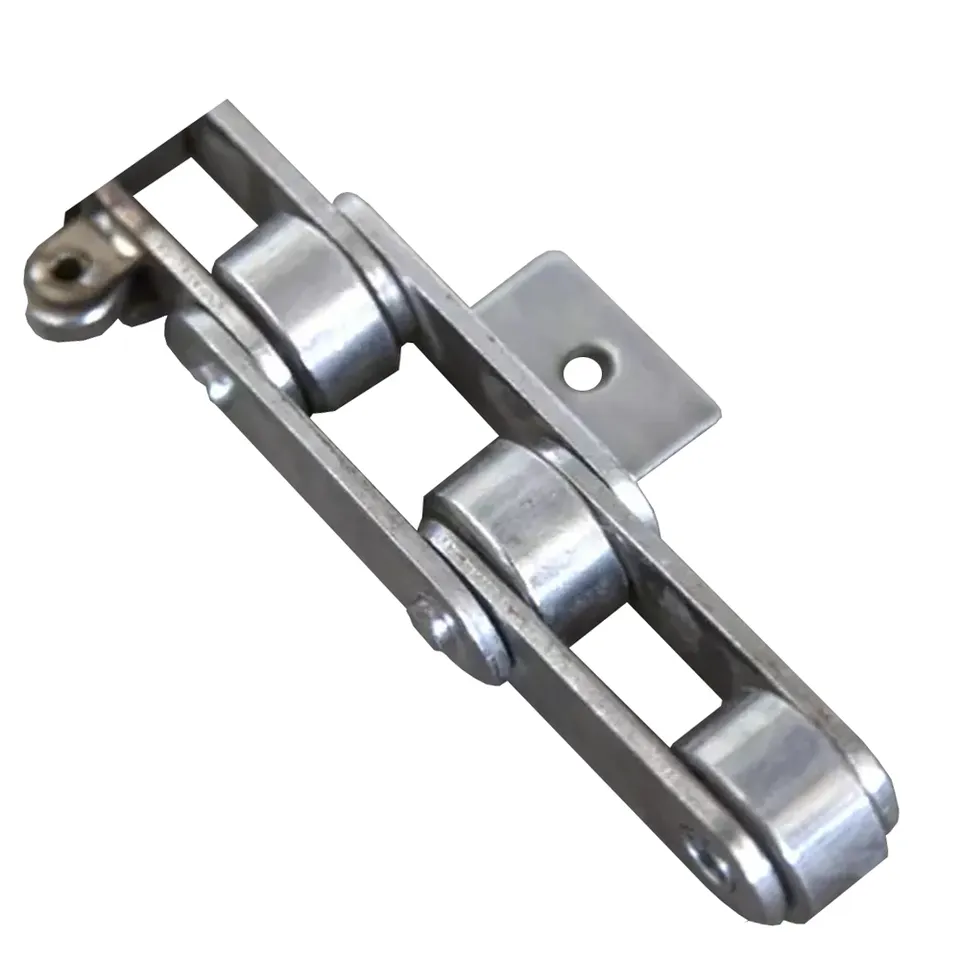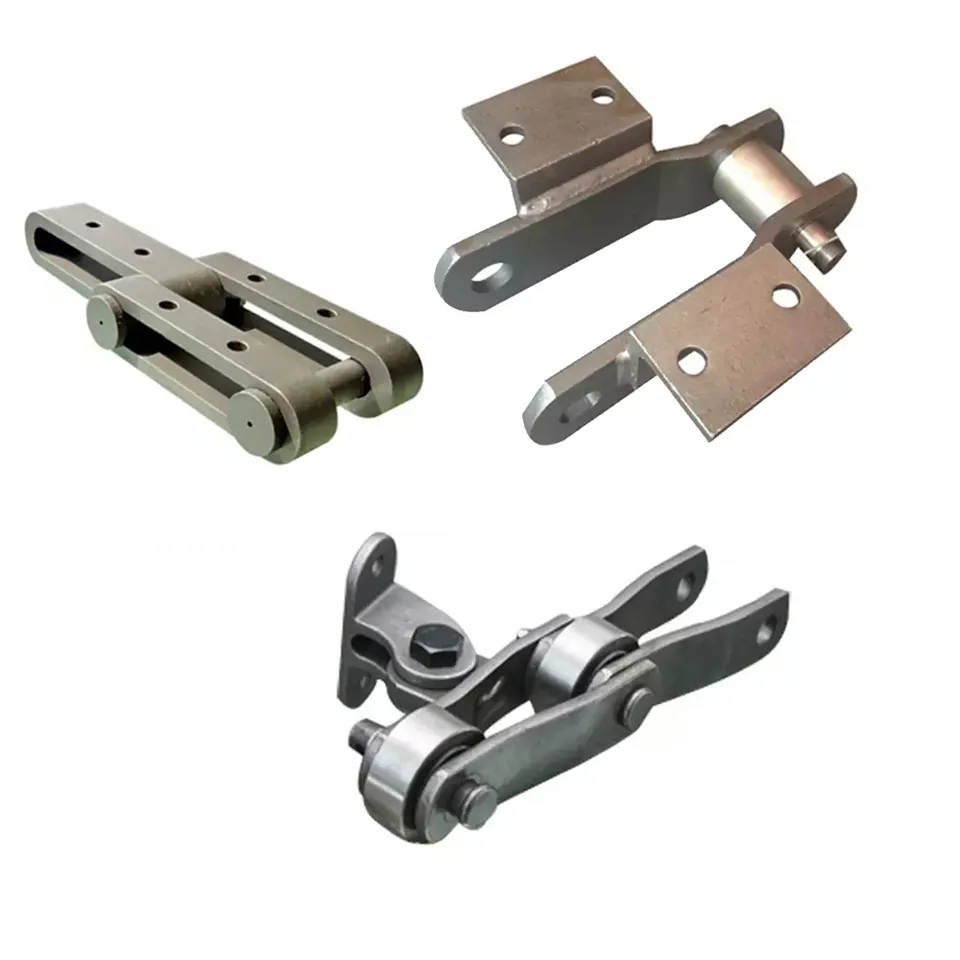Product Description
Product advantages:
| — Ten CoreTechnologies — | |||
| 1 | Chain strengh preload technology | 2 | Pin CRV treatment technology |
| 3 | Plate smoothly punching technology | 4 | Bush oil hole technology |
| 5 | Vacuum Oiled Technology | 6 | Precision Punching Technology |
| 7 | Low frequency fatigue test technology for lange size chain | 8 | Chain length comparison technology |
| 9 | Variation of silence design technology | 10 | Chain dynamic testingtechnology technologies |
Our Advantages:
1. Any inquiry you make will be answered professionally within 6~8 hours.
2. Attaches great importance to product quality and approved by many global quality system certification,such as France, Norway, Germany.
3. Focused on Chain since 1999, have rich experience in Production.
4. High-quality workers,First-class advanced equipment,good quality control,advanced technology.
5. Be Good at Custom-Made Products, provide customized services for customers.
6. Participated in the drafting of 24 national and industrial standards such as chains.As of 2571-Mar, CHOHO has 180 authorized patents.
7. With the responsibility of “Providing high quality chain system with the same service life for the global locomotive industry”, have established a strong R&D team.
By 2571,CHOHO has more than 2,7.
-CHOHO has 4 subsidiaries, including testing technology and international trading companies. has 4 factories in HangZhou, Thailand factory, ZheJiang R&D Center and Tokyo R&D Center. In addition, CHOHO ZHangZhoug Industrial zone is expected to be completed & put into operation next year.
-We specialized in producing all kinds of standard chains and special chains, such as Agricultural Chain, Sprocket, Chain Harrow, Tillage Parts,Rice Harvester Chain, GS38 Chain, Roller Chain, Automobile Chain, Motorcycle Chain Industrial Chain and so on.Our partners among world top enterprises, such as LOVOL,JOHN DEERE,NEWHOLLAND, CLASS,AGCO,DEUTZFAHR,HONDA, KUBOTA etc.
FAQ:
1. Are you manufacturer or trade Company?
We are a factory focused on producing and exporting Chain over 23 years,have a professional international trade team.
2. What terms of payment you usually use?
T/T 30% deposit and 70% against document, L/C at sight
3. What is your lead time for your goods?
Normally 30~45 days.Stock can be shipped immediately.
4. Do you attend any Show?
We attend Hannover show in Germany, EIMA in Italy, CHINAMFG in France, CIAME in China and many other Agricultural machinery shows.
5.Do you offer free samples?
Yes,we can.or you just bear the shipping cost.
6.Is OEM available?
Yes, OEM is available. We have professional designers to help you design.
/* January 22, 2571 19:08:37 */!function(){function s(e,r){var a,o={};try{e&&e.split(“,”).forEach(function(e,t){e&&(a=e.match(/(.*?):(.*)$/))&&1
| Standard or Nonstandard: | Standard |
|---|---|
| Application: | Conveyer Equipment, Agricultural Machinery |
| Surface Treatment: | Polishing |
| Samples: |
US$ 1/Meter
1 Meter(Min.Order) | Order Sample |
|---|
| Customization: |
Available
| Customized Request |
|---|
.shipping-cost-tm .tm-status-off{background: none;padding:0;color: #1470cc}
| Shipping Cost:
Estimated freight per unit. |
about shipping cost and estimated delivery time. |
|---|
| Payment Method: |
|
|---|---|
|
Initial Payment Full Payment |
| Currency: | US$ |
|---|
| Return&refunds: | You can apply for a refund up to 30 days after receipt of the products. |
|---|
Can mill chains be used in the forestry and timber processing industry?
Yes, mill chains are commonly used in the forestry and timber processing industry for various applications. These chains are well-suited to handle the demanding and rugged conditions encountered in this sector. Here are the details of how mill chains are utilized in the forestry and timber processing industry:
1. Timber Handling: Mill chains are used in conveyor systems to transport timber and logs from one processing stage to another. They can handle heavy loads and provide reliable material transfer, making them essential for efficient timber handling operations.
2. Sawmills: In sawmills, mill chains are utilized in sawing equipment and lumber processing machinery. They help feed the logs and lumber through the cutting and processing equipment, ensuring a smooth and continuous operation.
3. Debarking Machines: Mill chains are employed in debarking machines, which remove the bark from the logs before further processing. These chains withstand the abrasive effects of the bark and debris, maintaining their performance and longevity.
4. Chipper Machines: Mill chains are used in chipper machines that convert wood waste and by-products into wood chips or biofuel. These chains efficiently convey the wood materials through the chipping process.
5. Conveying and Sorting: Mill chains are integral components of conveyor systems used for sorting and transporting timber products. They ensure smooth and controlled material flow, optimizing production efficiency.
6. High Strength and Durability: Mill chains are designed to withstand heavy loads, shock loads, and abrasive conditions. This high strength and durability make them suitable for the demanding environments of the forestry and timber processing industry.
7. Customization: Chains can be customized to fit specific equipment and applications, allowing for optimal performance and precise material handling.
8. Reduced Maintenance: Mill chains are engineered to require minimal maintenance, reducing downtime and increasing overall productivity in timber processing operations.
9. Corrosion Resistance: In outdoor environments and in contact with wood, moisture, and other elements, corrosion-resistant mill chains are available, providing extended service life and preventing chain deterioration.
10. Environmental Considerations: Timber processing industries often operate in natural habitats. Using mill chains with low environmental impact, such as those with reduced noise and vibration, can be beneficial for the surrounding ecosystem.
Overall, mill chains are essential components in the forestry and timber processing industry, facilitating the efficient and reliable handling, cutting, and processing of wood materials at various stages of production.
What are the benefits of using a double-pitch mill chain in specific setups?
A double-pitch mill chain offers several advantages in specific material handling setups. This type of chain has a longer pitch, which means that the distance between each roller is increased compared to standard chains. Here are the benefits of using a double-pitch mill chain:
- Reduced Weight: Due to the longer pitch, a double-pitch mill chain typically has fewer components, making it lighter in weight. This can be beneficial in setups where weight reduction is desired.
- Lower Cost: With fewer components and simpler construction, double-pitch mill chains can be more cost-effective compared to standard chains. This can be advantageous when working within budget constraints.
- Smooth Operation: The longer pitch results in smoother and quieter operation of the chain, reducing noise and vibration during material handling processes.
- Reduced Friction: The longer pitch also means that the chain encounters fewer sprocket teeth during each rotation, reducing friction and wear on both the chain and sprockets.
- Extended Life: The reduced wear and lower friction contribute to an extended service life for the chain, minimizing the need for frequent replacements and maintenance.
- Material Handling Flexibility: Double-pitch mill chains can handle a wide range of materials, making them suitable for various applications in different industries.
- Conveying Larger Objects: The larger pitch allows double-pitch mill chains to accommodate larger and bulkier objects, making them suitable for setups where oversized materials need to be transported.
- Convenient Maintenance: With longer intervals between replacements and reduced wear, double-pitch mill chains can offer more convenient maintenance schedules.
It’s important to note that while double-pitch mill chains have their benefits, they are not suitable for all applications. The longer pitch may result in reduced strength and load capacity compared to standard chains, so it’s essential to carefully consider the specific requirements of the material handling setup before selecting the chain type.
What materials are mill chains typically made of for different industries?
Mill chains are manufactured using various materials to suit the specific requirements of different industries and applications. The choice of material depends on factors such as the operating environment, load capacity, and resistance to wear and corrosion. Here are some commonly used materials for mill chains in different industries:
1. Carbon Steel: Carbon steel mill chains are widely used in various industrial applications due to their high tensile strength and affordability. They are suitable for medium to heavy-duty material handling tasks and can withstand harsh conditions.
2. Stainless Steel: Stainless steel mill chains are preferred in industries where corrosion resistance is crucial. They are commonly used in food processing, chemical, and pharmaceutical industries where exposure to moisture, chemicals, or high temperatures can occur.
3. Alloy Steel: Alloy steel mill chains are known for their exceptional strength and durability. They are used in heavy-duty applications, such as steel manufacturing, mining, and forestry, where the chains are subjected to significant loads and abrasion.
4. Nickel-Plated Steel: Nickel-plated steel mill chains provide additional protection against corrosion and wear. They are often used in industries where exposure to chemicals or outdoor elements is a concern.
5. Plastic or Polymer: In certain industries, such as food and beverage manufacturing or electronics, plastic or polymer mill chains may be used. These chains offer non-metallic properties, making them ideal for applications that require chemical resistance and low-noise operation.
6. Galvanized Steel: Galvanized steel mill chains are coated with a layer of zinc to enhance their corrosion resistance. They are commonly used in outdoor applications or environments where moisture and rust may be a concern.
It’s essential to choose the right material based on the specific needs of the industry and the operating conditions of the application. Factors such as load capacity, speed, temperature, and exposure to chemicals or moisture play a crucial role in determining the appropriate material for mill chains in different industries.
editor by CX 2024-05-06




